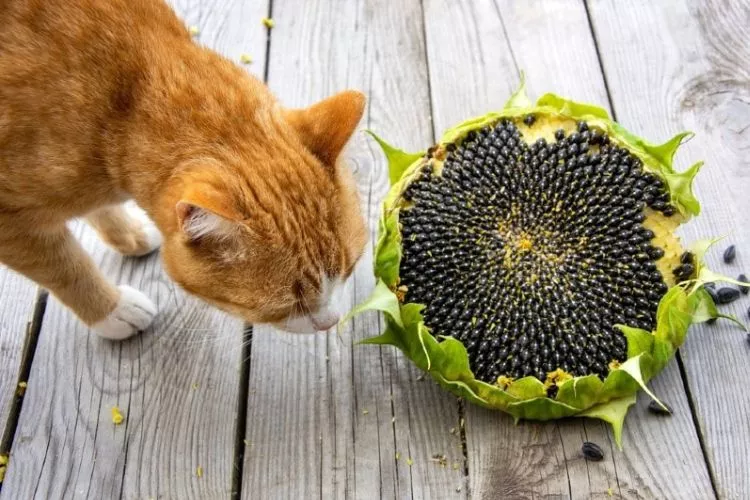Cats are notorious for their curious nature and tendency to sample various foods, including items not typically found in their natural diet.
As a responsible pet owner, it’s essential to understand what foods are safe and suitable for your feline companion. So, can cats eat sunflower seeds?
In this comprehensive guide, we will explore the safety, nutritional value, serving sizes, risks, and frequently asked questions about cats consuming sunflower seeds.

🐾 Can Cats Eat Sunflower Seeds?
When it comes to feeding our beloved cats, safety is of utmost importance. The good news is that sunflower seeds are generally considered safe for cats to consume.
According to the American Society for the Prevention of Cruelty to Animals (ASPCA), sunflower seeds are non-toxic to cats. However, it’s important to exercise caution and feed them in moderation.
🐾 Nutritional Value of Sunflower Seeds for Cats:
Sunflower seeds offer some nutritional benefits for cats. These small seeds are a good source of protein and contain essential vitamins, including vitamin E, vitamin B1, and vitamin B5.
In addition, they provide minerals such as magnesium, phosphorus, and copper. Including sunflower seeds in your cat’s diet can help supplement their nutritional needs, but moderation is key.
🐾 Moderation is Key: Serving Sizes for Cats
While sunflower seeds offer nutritional value, it’s crucial to feed them in appropriate serving sizes. As high in fat content, overfeeding sunflower seeds can contribute to health issues such as obesity and digestive problems.

Veterinarians recommend introducing sunflower seeds in small amounts as a special treat, not as a primary dietary component. A quarter teaspoon to half a teaspoon per day is a suitable serving size, depending on your cat’s size and weight.
🐾 Risks and Considerations:
While sunflower seeds are generally safe for cats, there are a few risks and considerations to keep in mind. Some cats may have allergies or digestive sensitivities, which can manifest as vomiting, diarrhea, or other adverse reactions.
If you notice any signs of discomfort or unusual behavior after feeding sunflower seeds, it is best to discontinue their consumption and consult a veterinarian.
Additionally, if your cat has any pre-existing health conditions or dietary restrictions, it’s essential to seek professional guidance before introducing sunflower seeds into their diet.
You may also like to find out: Can Cats Eat Sesame Seeds? | Can Cats Eat Almond Butter?
🐾 Are any seeds toxic to cats?
Certainly! Here is the detailed answer with subheadings:

Fruit Seeds
Some fruit seeds can be toxic to cats and should be avoided. These seeds include those found in apples, cherries, peaches, plums, and apricots. The seeds of these fruits contain compounds like amygdalin, which can release cyanide when ingested by cats.
Cyanide is highly toxic and can cause serious health issues in cats. Therefore, it’s important to remove the seeds from these fruits before offering them to your cat.
Seeds from Toxic Plants
Certain plants and houseplants have seeds or berries that are toxic to cats. Examples of plants with toxic seeds include lilies, sago palms, azaleas, and rhododendrons.
Ingesting these seeds can lead to symptoms such as gastrointestinal upset, vomiting, diarrhea, lethargy, and even organ failure in severe cases. It’s essential to be aware of the potential toxicity of these plants and ensure that your cat does not have access to them.
Other Considerations
While fruit seeds and seeds from toxic plants are the primary concerns, it’s important to be cautious with other types of seeds as well. Some seeds may be difficult for cats to digest or may cause intestinal blockages if ingested in large quantities.
Therefore, it’s generally best to provide only small, manageable portions of seeds, if at all, and monitor your cat’s response.
Seeking Veterinary Advice
It’s crucial to note that this list of toxic seeds for cats is not exhaustive and there may be other seeds that can be harmful to cats. If you are uncertain about the safety of a specific seed or plant, it’s best to consult with a veterinarian or refer to reliable sources for more detailed information.
Veterinarians can provide personalized advice based on your cat’s individual health needs and can help you make informed decisions about what is safe for your feline companion.
Please remember that this information is for general knowledge and should not replace professional veterinary advice. If you have any specific concerns or questions about your cat’s health, it is always best to consult with a veterinarian to ensure the well-being of your pet.
🐾 Frequently Asked Questions (FAQs)
Cats should not consume sunflower seeds with shells, as the shells are difficult to digest and may cause digestive issues or pose a choking hazard. It is recommended to remove the shells before feeding sunflower seeds to your cat.
Yes, cats can eat sunflower seeds as long as they are raw and unsalted. Salted or flavored sunflower seeds contain added ingredients that are not suitable for cats. Always opt for plain, unsalted sunflower seeds to ensure their safety.
Pumpkin seeds are safe for cats to consume in moderation. Similar to sunflower seeds, they offer nutritional benefits and can be a healthy addition to their diet. However, refrain from feeding your cat pumpkin seeds with added salt or spices.
Conclusion:
In conclusion, cats can eat sunflower seeds when offered in moderation and without their shells. These small seeds provide essential nutrients for your feline companion.
Remember to introduce sunflower seeds gradually and in appropriate serving sizes to prevent any adverse reactions or potential health issues.
As with any dietary changes, it is always advisable to consult with a veterinarian to ensure your cat’s specific needs are met.
By taking proper precautions, you can safely incorporate sunflower seeds into your cat’s diet as an occasional treat and provide them with a well-rounded nutritional experience.
